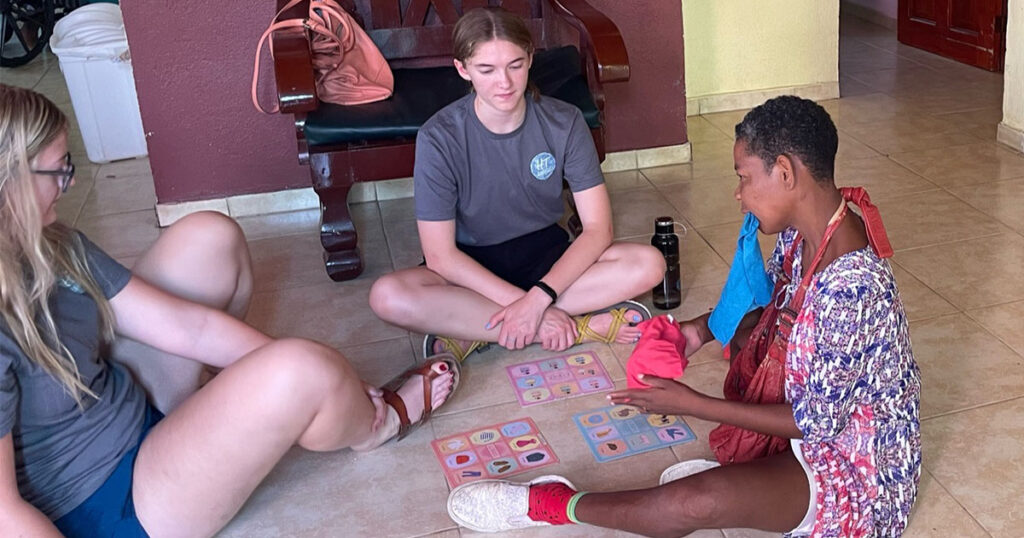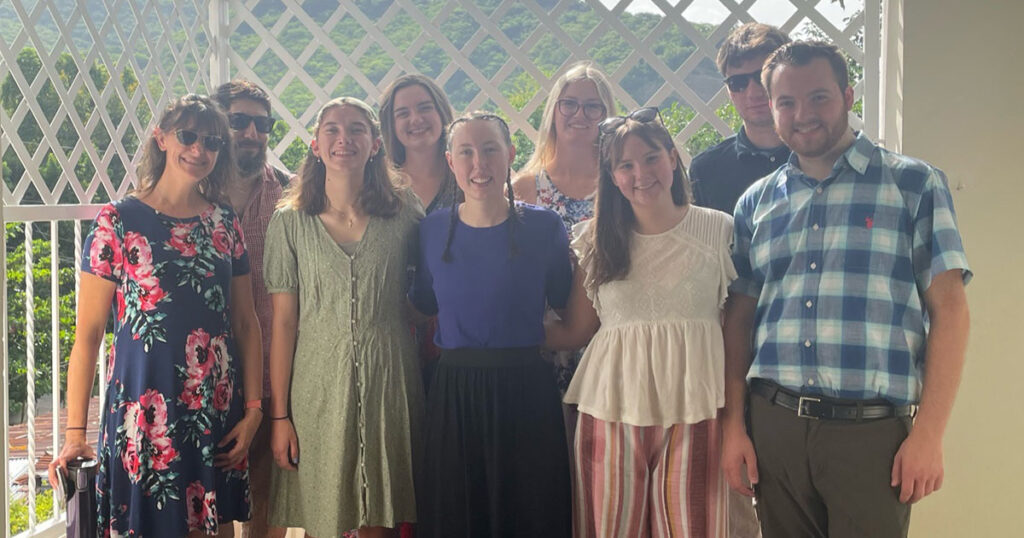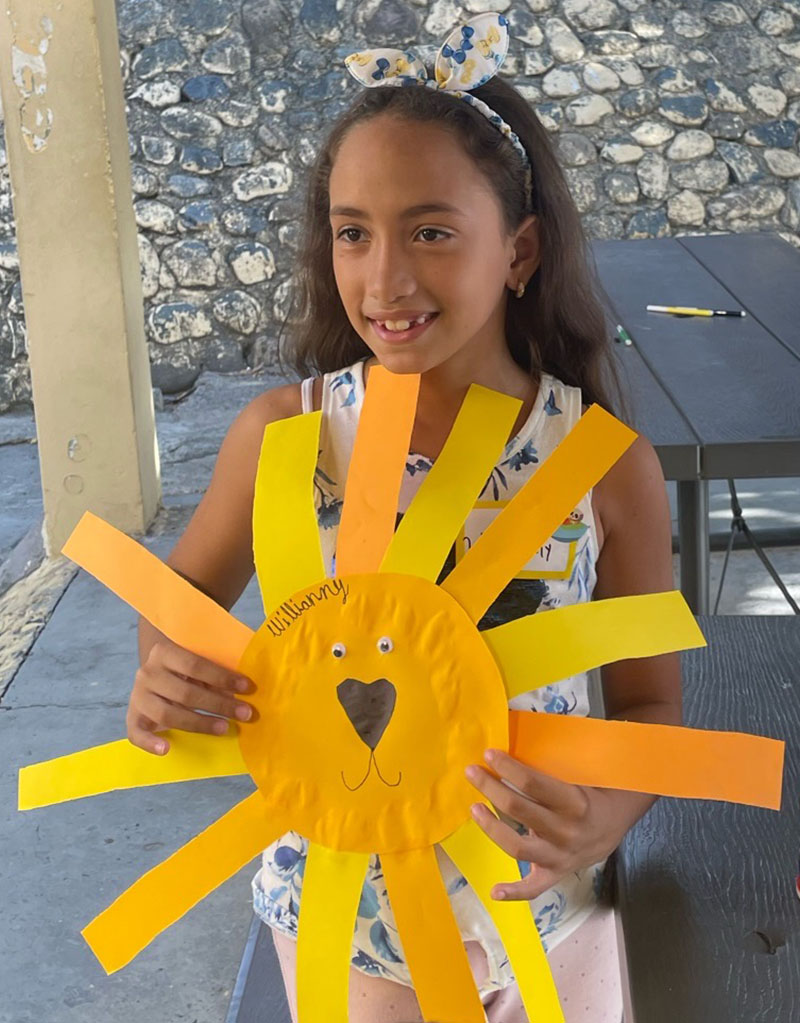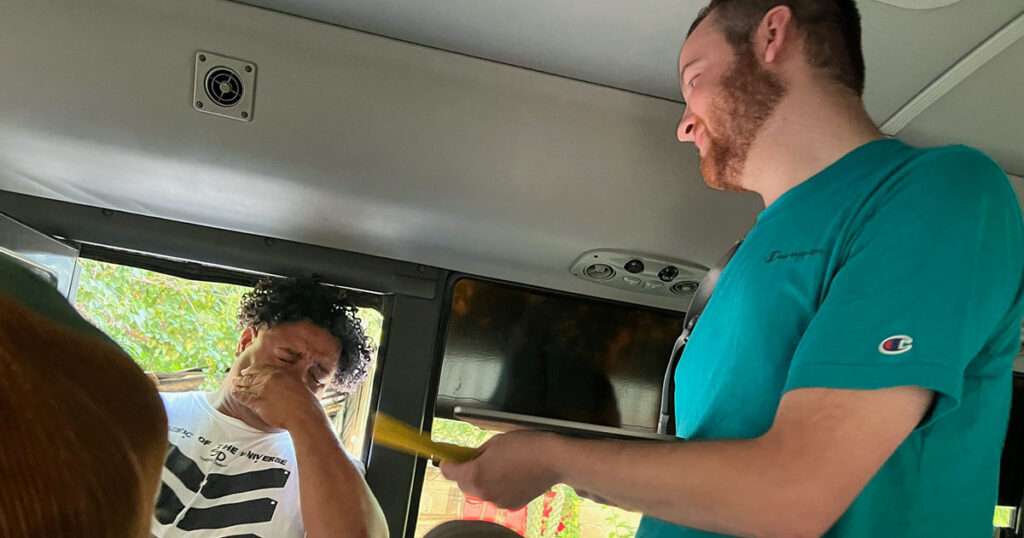
Sarah Redhage, left, and Makia Adler play a board game in 2023 with a member at the Hogares Luteranos el Buen Pastor (Good Shepherd Lutheran Homes), a community established by the Lutheran church to care for young adults with developmental disabilities. (Photo courtesy of Olivia Beyreis.)
By Adam Losser
“Why are we here?” asked Pastor Goodman.
The seven young adults on the Higher Things Abroad team, including myself, were silent.
“Come on, guys. Why did we travel all the way to the Dominican Republic?”
“To share the Gospel,” someone mumbled.
“To put on a VBS,” another added.
“To help improve the playground of a local Lutheran school,” a third person chimed in.
“Well, I suppose those are all technically the reasons we’re here,” Pastor Goodman stated in a matter-of-fact way. He paused for a moment. “But let me ask you this: Aren’t the local pastors here more than capable of sharing the Gospel?”
“And the local pastors, deaconesses and career missionaries… they’re more than capable of putting on a VBS, are they not?”
“We suppose so,” the group replied.
“And the playground improvement work… couldn’t that be done by local people? All we’re doing is digging a trench and burying some tires.”
The group thought about it for a moment, but no one spoke.
“I ask all these questions not to make you feel bad. But we have to address the elephant in the room. When you think about it, if you consider the complete cost of organizing this week-long trip, it’s enough to put a local man through four years of seminary. That local man could minister in this community for many years. The reality is that most of the children attending our VBS will not get baptized. So, what’s the real reason we’re here?”
That was a question that, at least for me, wasn’t fully answered until the end of the trip. As they say, “Hindsight is 20/20.”
I have to admit, when I first heard about the 2023 Higher Things Abroad trip at a Higher Things (HT) conference last summer, I basically had two motivations for applying.
First, I saw it as an opportunity to be more involved with HT. Coming from a small congregation in Utah (where Mormonism reigns supreme), I was eager for ways to be involved with the Lutheran church and develop new friendships with other Lutheran young adults.
Second, I was excited by the prospect of embarking on a new travel adventure. While in college, I had the opportunity to travel to several countries in Latin America and Europe, and I was eager to travel to the Dominican Republic to practice my Spanish and explore the country.
In hindsight, I suppose these weren’t terrible motivations to go on a mission trip, but they weren’t good reasons compared to the reason that Pastor Goodman impressed upon us.
So, what exactly is this reason? Why did we go to the Dominican Republic for a week? While the answer is multifaceted, I feel that it can be summarized in two words that go hand in hand: education and edification. I came to realize that the main purpose of our trip was to educate and edify us, the people going on the trip, all while sprinkling seeds of the Gospel and assisting career missionaries in small — but legitimately helpful — ways. Allow me to illustrate using examples from my experience in the Dominican Republic.

The members of the Higher Things Abroad team pose for a group photo on the top floor of Seminario Concordia el Reformador (Concordia the Reformer Seminary) in Palmar Arriba Santiago in 2023. (Photo courtesy of Olivia Beyreis.)
Education
Our team learned several important lessons over the course of the trip. First, we learned the importance of not conflating the American way of ministering with God’s way of ministering. We learned that many resources typically used for VBS in the United States are not actually necessary.
For example, one might think that electricity is needed to put on a VBS, but we learned that this is not the case: We sang songs without accompaniment because there was no electricity to power our digital piano, and the kids sang just as boldly as if they had been accompanied.
One might also think that the American practices of having a sign-up sheet and adhering to a strict schedule are vital for a successful VBS, but we found that adopting the “event time” mindset of the Dominicans allowed us to slow down and appreciate each moment. We had time to talk to kids about the snacks they made, ask them deeper questions, play games with them, and accept new kids into the VBS as the week went on.
Lastly, we learned the importance of community to the Dominicans. It was amazing to see older siblings caring for and directing their younger siblings during the VBS. We were also privileged to spend time with the incredible people at the Hogares Luteranos el Buen Pastor (Good Shepherd Lutheran Homes) — a community established by the Lutheran church to care for young adults with developmental disabilities. Before embarking on the trip, we never could have imagined the sign language jokes, güira jam sessions, board games, meals and conversations we would enjoy with the group home members. It’s one thing to read about such a community, but it’s entirely another to experience it firsthand.
Herein lies the beauty of the education that mission trips provide — you can learn things firsthand that you simply can’t learn from a book or the internet.
Edification
Further, our group learned anew that God can work through any means to bring about His will. Where His Word is rightly preached and His Sacraments rightly administered, there His church is present. Of course, we knew this before departing for our trip, but it clicked in a way that it never had before (at least for me) while we were in the DR.
We pondered the fact that one doesn’t have to worship in a grand, European cathedral to find God. In fact, many small and humble churches are more faithful than grand cathedrals these days.
Personally, I come from a small church in Utah. I used to think to myself, “If only I lived in the Midwest! Then I’d have all the resources of a big Lutheran church. I could have fellowship with so many more people and participate in and lead so many more activities.’” But in the DR, I realized the foolishness of these thoughts. I internalized the reality that small churches have everything they need: the Word rightly preached and the Sacraments rightly administered.

A Vacation Bible School attendee at Cienfuegos, Santiago, displays her lion craft. The VBS was conducted by the Higher Things Abroad team in 2023. (Photo courtesy of Olivia Beyreis.)
Additionally, it’s impossible to spread the Gospel if one only ever talks to/has fellowship with other Lutherans. Although small churches are seemingly lacking in resources, the reality is that they are often located in some of the biggest mission fields in the world. Living in a large mission field, such as Utah, offers more opportunities to share the Gospel than living in a place where the majority of people have already heard the Gospel. Thus, the trip edified and inspired me to make the most of the resources I do have and embrace the mission field God has put me in.
Sprinkling seeds of the Gospel
Although the HT Abroad team members were not as well-trained as the career missionaries in the DR, we were still able to sprinkle seeds of the Gospel. The VBS was divided into four stations: Bible lessons, crafts, snacks and music. While the Gospel was shared most directly at the Bible lessons station, the other stations reflected the themes of the Bible lessons for each day. For example, the story for the first day was “Daniel in the Lions’ Den.” The crafts were paper lions and the snacks were lion crackers.
Additionally, we were able to share Christ’s love with non-Christians we interacted with in the DR. The most memorable part of the trip for me was getting to write a thank-you note to our bus driver, Rudy. We didn’t know much about Rudy. We knew that he was a single dad of two girls. He was mostly illiterate and didn’t speak any English. He didn’t belong to the church, but he did an amazing job driving us around. I had the privilege of writing him a thank-you note (on behalf of the whole group) and reading it to him in Spanish on the last day of our trip. Along with the note, we gave him all our spare cash as a tip. He burst into tears, and it was so heartwarming to see this lonely man experience the love we gave him as a reflection of Christ’s love for us. We were able to share the Gospel in small yet powerful ways on our trip.
Assisting career missionaries
Even though the career missionaries did the heavy lifting by translating for us and providing us with accommodations, meals and transportation, we were able to legitimately help them in several ways.
First, we provided the VBS curriculum and teaching, so they could focus on translating. We also dug a trench at the seminary and buried some tires in it to section off an area of the playground. This brought the Lutheran school (housed inside the seminary) closer to legal accreditation.
We also had the opportunity to transport a mattress from the house of one career missionary to another using the Dominican style of transportation (throwing the mattress on the roof of a car, not strapping it down, rolling the car windows down, and holding onto the mattress while sitting in the car to secure it)! While the career missionaries could have easily done these things themselves, our presence allowed them to focus on other, more pressing needs of the church.

Adam Losser thanks the team’s bus driver, Rudy, after their last bus ride. (Photo courtesy of Olivia Beyreis.)
Conclusion
In the end, I’m glad I went on the trip. Before the trip, I had several people discourage me. One person told me, “You’re just participating in voluntourism; you can’t do any legitimate good on a short-term mission trip.” My response to people with these concerns is that, while it’s true that short-term mission trips don’t revolutionize the countries in which they’re conducted, they can be helpful if executed with the guidance of local churches in the destination country.
Of course, career missionaries will always be more impactful and competent than short-term teams because of their extensive training. However, short-term teams play an important role in recruiting and inspiring future career missionaries. After all, every career missionary currently serving started somewhere with no experience. So, if you’re on the fence about serving a short-term mission with the LCMS, I’d encourage you to try it. You might not revolutionize the country in which you serve, but you will have an impact, and it might very well change your perspective on the world in ways you can’t foresee.
If you are interested in exploring service as an LCMS missionary, learn more at lcms.org/service and consider shadowing a missionary.
Adam Losser is the organist and handbell choir director at Christ Lutheran Church in Murray, Utah. He graduated Cum Laude from the University of Utah in May 2023 with a degree in electrical engineering. He currently works as a research assistant and clinical trial coordinator for the Targeted Treatments Lab — a lab at the University of Utah pioneering new ultrasound-based non-invasive treatments for depression, chronic pain and other deep brain disorders. Currently applying for grad school, he hopes to work as an engineer in the medical device field in the future. Always up for an adventure, he enjoys hiking, mountain biking, traveling, camping, and reading in his free time.